Transforming your garage into a functional gardening hub can greatly enhance your gardening experience. By creating a dedicated space for gardening tools and supplies, you’ll be able to work more efficiently and enjoy the process even more.
Gardening organization tips can help you make the most of your garage space. With a well-organized gardening station, you’ll be able to find what you need quickly, reducing clutter and making gardening a joy.
Efficient garage storage solutions are key to a successful gardening station. By implementing the right storage and organization systems, you’ll be able to keep your gardening tools and supplies tidy and within reach.
Key Takeaways
- Create a dedicated gardening space in your garage
- Improve your gardening experience with organization tips
- Implement efficient garage storage solutions
- Reduce clutter and make gardening more enjoyable
- Make the most of your garage space with a well-organized gardening station
Why Your Garage Makes the Perfect Gardening Hub
Transforming your garage into a gardening hub is a game-changer for gardening enthusiasts. By dedicating a space to gardening, you can significantly enhance your overall gardening experience.
Benefits of a Dedicated Gardening Space
A dedicated gardening space in your garage provides numerous benefits, including improved organization and efficiency. With a diy gardening station setup, you can keep your tools and supplies organized, making it easier to access what you need when you need it. This can lead to a more enjoyable gardening experience, as you’ll spend less time searching for misplaced items.
Year-Round Accessibility
One of the primary advantages of having a garage gardening station is the ability to garden year-round, regardless of the weather outside. This garden tools organization allows you to start seeds, propagate plants, and perform other gardening tasks in a comfortable and controlled environment.
Protection from the Elements
A garage gardening station also provides protection from the elements, shielding your tools and supplies from harsh weather conditions. By utilizing creative garage organization ideas, you can create a space that is both functional and protected.
By converting your garage into a gardening hub, you can enjoy a more organized, efficient, and enjoyable gardening experience.
Assessing Your Garage Space and Gardening Needs
Before setting up your garage gardening station, it’s crucial to assess the available space and your gardening requirements. This initial assessment will help you create a functional and efficient gardening hub.
Measuring Available Space
Start by measuring the dimensions of your garage, including the width, length, and height. Take note of any obstacles, such as windows, doors, and electrical outlets. This will help you determine the best layout for your gardening station. Consider using a diagram or sketch to visualize your garage space.
| Measurement | Dimension |
|---|---|
| Width | 12 feet |
| Length | 20 feet |
| Height | 8 feet |
Identifying Your Gardening Style and Requirements
Next, think about your gardening style and what you need to support it. Are you a beginner or an experienced gardener? Do you focus on vegetables, flowers, or a mix of both? Make a list of the tools, supplies, and equipment you use regularly. As one expert notes, “Understanding your gardening needs is key to creating a functional gardening station.” This will help you prioritize your needs and create a wish list for your gardening station.
“A well-organized gardening station is not just about storage; it’s about creating a workflow that makes gardening easier and more enjoyable.”
Creating a Gardening Station Wish List
With your measurements and gardening needs in mind, create a wish list for your gardening station. Consider the essential elements, such as a workbench, storage for tools and supplies, and a potting area. You can also think about additional features, like a sink or a greenhouse. Prioritize your needs based on importance and budget.
- Workbench for potting and planting
- Storage for tools, seeds, and fertilizers
- Potting area with easy-to-clean surfaces
- Sink for watering and cleaning
By assessing your garage space and gardening needs, you’ll be able to create a gardening station that is tailored to your specific requirements, making gardening more efficient and enjoyable.
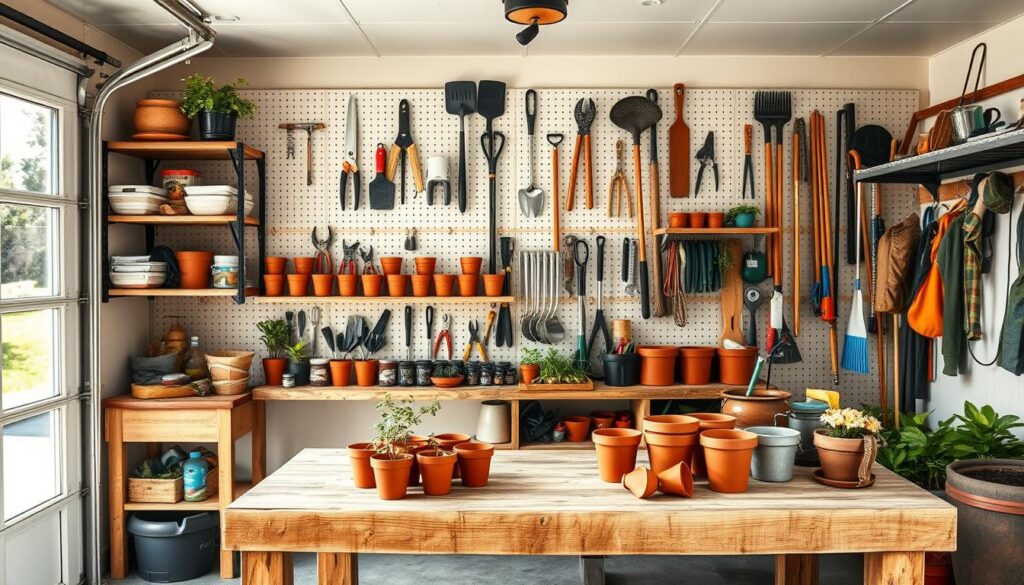
How to Organize a Gardening Station in Your Garage: Planning Phase
A well-planned garage gardening station is the foundation of a thriving gardening experience. To achieve this, you need to consider several key factors that will make your gardening station both functional and efficient.
Zoning Your Garage for Multiple Functions
One of the first steps in planning your garage gardening station is to zone the space for multiple functions. This means designating areas not just for gardening, but also for other activities such as storage, workshops, or even parking. Efficient zoning is crucial for maintaining a clutter-free and productive environment.
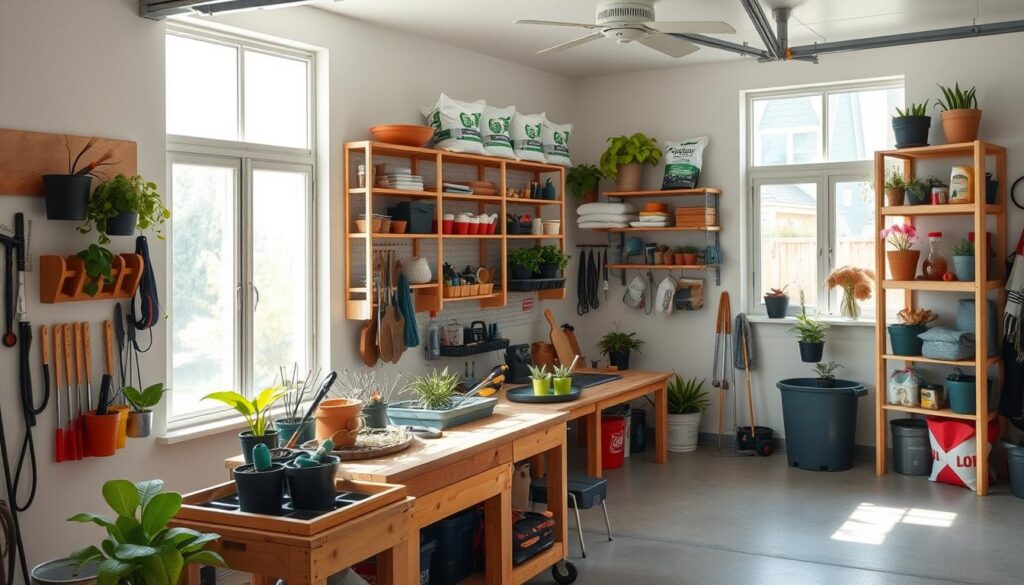
Creating a Layout Diagram
Once you have identified the different zones in your garage, the next step is to create a layout diagram. This visual representation will help you plan the placement of your gardening station, storage solutions, and other elements. It’s a crucial step in achieving an efficient garage gardening setup.
Budgeting for Your Gardening Station
Budgeting is another critical aspect of the planning phase. You need to determine how much you are willing to spend on your gardening station, including storage solutions, workbenches, and other necessary equipment. Setting a budget will help you make informed decisions and ensure that your project remains financially sustainable.
By carefully zoning your garage, creating a detailed layout diagram, and setting a realistic budget, you can create a gardening station that is both functional and enjoyable to use. This thoughtful approach will ultimately lead to a more efficient garage gardening setup and better garage storage solutions.
Essential Storage Solutions for Garden Tools and Supplies
A well-organized garage gardening station starts with the right storage solutions. Effective storage not only keeps your tools and supplies in good condition but also makes your gardening tasks more efficient.
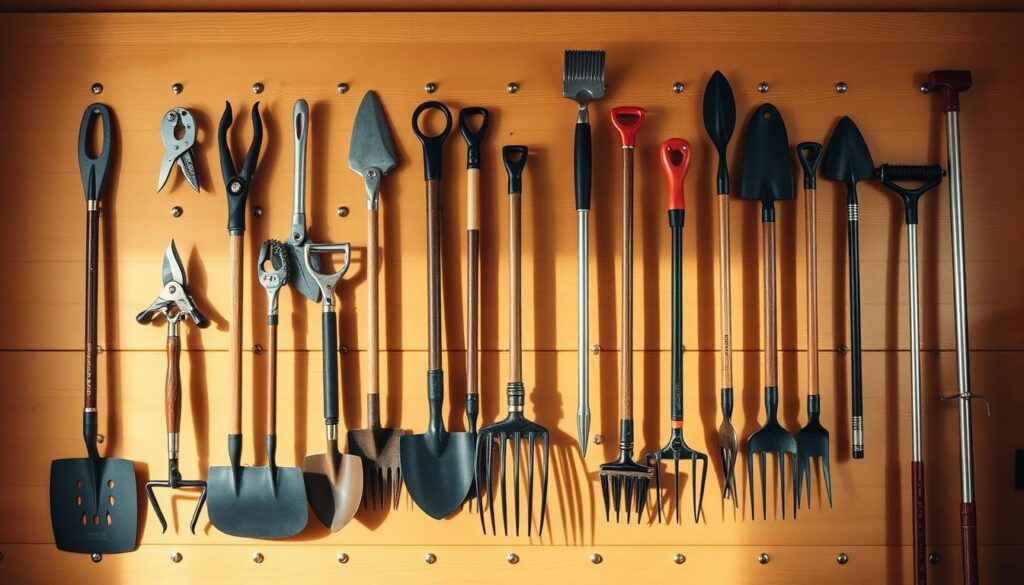
Wall-Mounted Storage Systems
Wall-mounted storage systems are a great way to keep your garden tools organized and within reach. Consider installing hooks, bins, or a pegboard on your garage walls to hang tools, seeds, and other supplies. This approach keeps your floor clear and makes the most of your garage’s vertical space.
Shelving Options for Containers and Pots
Shelving is another effective storage solution for your gardening supplies. You can use sturdy shelving units to store containers, pots, and other equipment. Adjustable shelves allow you to customize the storage to fit your needs.
Mobile Storage Solutions
For added flexibility, consider mobile storage solutions such as tool carts or rolling storage bins. These can be easily moved around your garage or taken outside as needed, making them ideal for tasks that require multiple tools or supplies.
Utilizing Overhead Space
Don’t forget about the overhead space in your garage. Overhead storage racks can be used to store less frequently used items, such as seasonal decorations or out-of-season gardening equipment, keeping them out of the way but still accessible.
By incorporating these storage solutions, you’ll be able to maintain a clutter-free and efficient gardening station in your garage, making your gardening experience more enjoyable and productive.
Setting Up a Functional Potting Area
A well-designed potting area can transform your garage into a productive gardening hub. This dedicated space is where you’ll be planting, nurturing, and preparing your plants for the garden, making it a crucial component of your diy gardening station setup.
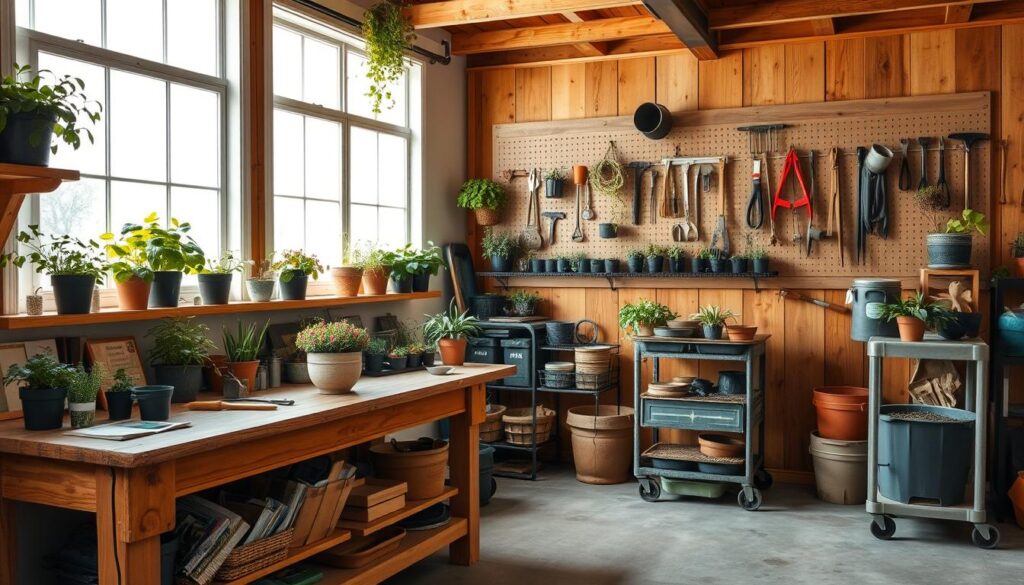
Choosing the Right Workbench
The workbench is the centerpiece of your potting area. When selecting a workbench, consider the material, size, and height. A sturdy, stainless steel or weather-resistant wood workbench is ideal as it can withstand the moist environment and heavy use.
Ergonomic Considerations
Ergonomics play a significant role in creating a comfortable and efficient potting area. Ensure the workbench is at a comfortable height to avoid straining your back. Consider adding a stool or a standing desk converter to alternate between sitting and standing.
Soil and Amendment Storage
Efficient storage for soil and amendments is crucial. Use airtight containers or bins to keep the materials fresh and organized. Labeling these containers will help you quickly identify the contents, streamlining your gardening process.
Easy-Clean Surfaces and Materials
To maintain a clean and healthy environment, choose surfaces and materials that are easy to clean. A smooth, water-resistant surface on your workbench and surrounding areas will make cleaning up spills and messes much simpler, maximizing your garage space for gardening.
Organizing Your Garden Tools for Maximum Efficiency
Efficient garden tool organization is crucial for a productive garage gardening setup. A cluttered and disorganized tool collection can lead to wasted time and frustration. By implementing a few simple strategies, you can maximize your gardening efficiency and make the most of your garage space.
Categorizing Tools by Function
Start by categorizing your garden tools based on their function. Group together tools used for planting, pruning, watering, and other specific tasks. This categorization makes it easier to locate the tools you need when you need them.
Creating Custom Tool Holders
Custom tool holders can help keep your tools organized and within reach. Consider using pegboards or slatwall panels to hang your tools. You can also repurpose old containers or create DIY holders to store smaller items.
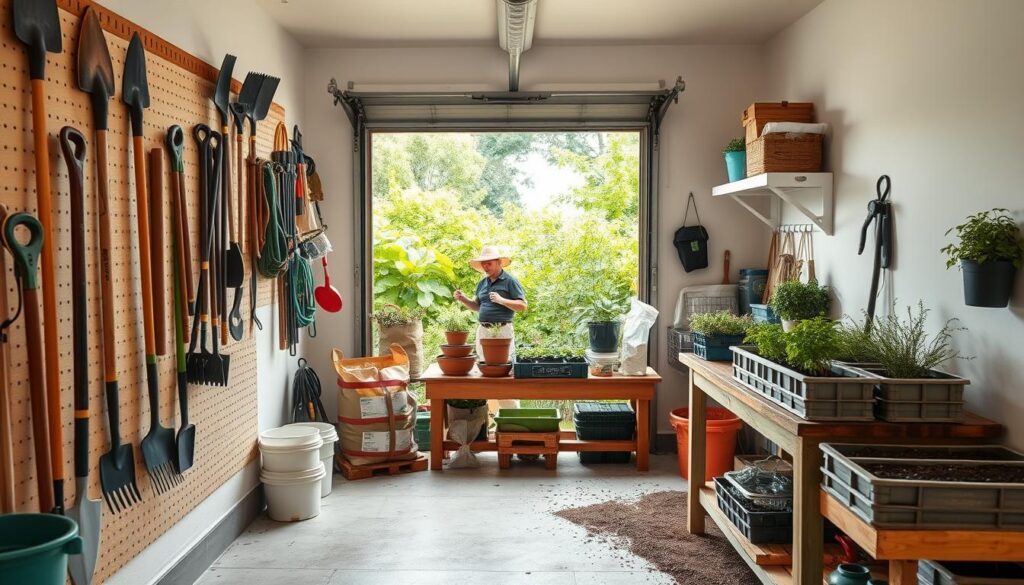
Quick-Access Systems for Frequently Used Items
Implementing quick-access systems for your most frequently used tools can save you time and effort. Store these tools in easy-to-reach locations, such as in a designated drawer or on a hook near your workbench.
Tool Maintenance Station
A tool maintenance station can help extend the life of your garden tools. Designate a specific area for cleaning, sharpening, and storing your tools. Regular maintenance ensures that your tools remain in good condition and are ready for use when needed.
| Tool Category | Storage Solution | Maintenance Tip |
|---|---|---|
| Planting Tools | Pegboard with hooks | Clean after each use |
| Pruning Tools | Slantwall with bins | Sharpen regularly |
| Watering Tools | Designated bucket | Check for leaks |
Lighting and Climate Control for Your Garage Garden Station
Creating an optimal garage gardening station requires careful consideration of lighting and climate control. A well-designed garage garden is not just about storage; it’s about creating an environment where plants can thrive and gardening tasks are made easier.
Natural and Artificial Lighting Options
Maximizing natural light is crucial, but often, garages lack sufficient natural illumination. Supplementing with LED grow lights can provide the necessary spectrum for plant growth. When choosing artificial lighting, consider the specific needs of your plants and the color temperature of the lights.
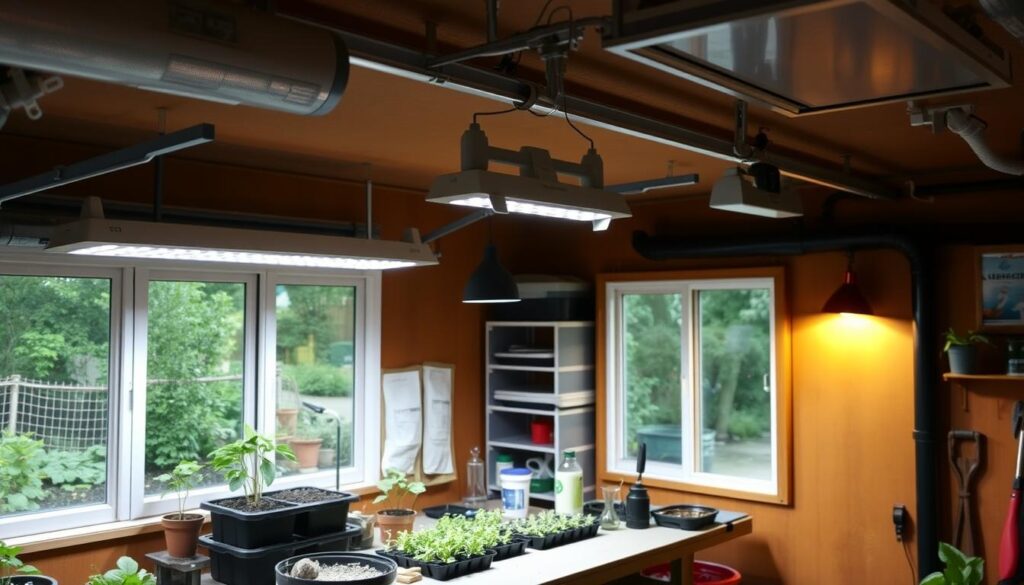
Temperature Management Solutions
Garages can be prone to extreme temperatures. Using insulation and climate-controlled heaters or coolers can help maintain a stable temperature, ideal for seed starting and tool storage.
Humidity Control for Seed and Tool Preservation
Maintaining the right humidity level is vital for preserving seeds and tools. Using dehumidifiers or humidifiers as needed can prevent rust and keep seeds viable.
Ventilation Considerations
Proper ventilation is essential to prevent the buildup of stale air and moisture. Installing vents or exhaust fans can help maintain air circulation, ensuring a healthy environment for both plants and gardener.
Smart Solutions for Seed Storage and Organization
For gardeners, having a smart seed storage system in their garage can be a game-changer. It not only helps in keeping the seeds organized but also in maintaining their viability. A well-organized seed storage system is crucial for maximizing garage space for gardening and ensuring that your gardening efforts are successful.
Climate-Controlled Storage Options
Seeds are sensitive to temperature and humidity, making climate-controlled storage a must. Consider using airtight containers or bins that can be kept in a cool, dry part of your garage. Some gardeners also use old refrigerators or freezers for seed storage, ensuring a consistent low temperature.
Cataloging and Labeling Systems
A good cataloging and labeling system is essential for keeping track of the different types of seeds you have. You can use a simple spreadsheet or a gardening app to catalog your seeds. For labeling, consider using waterproof labels and a marker that won’t fade over time.
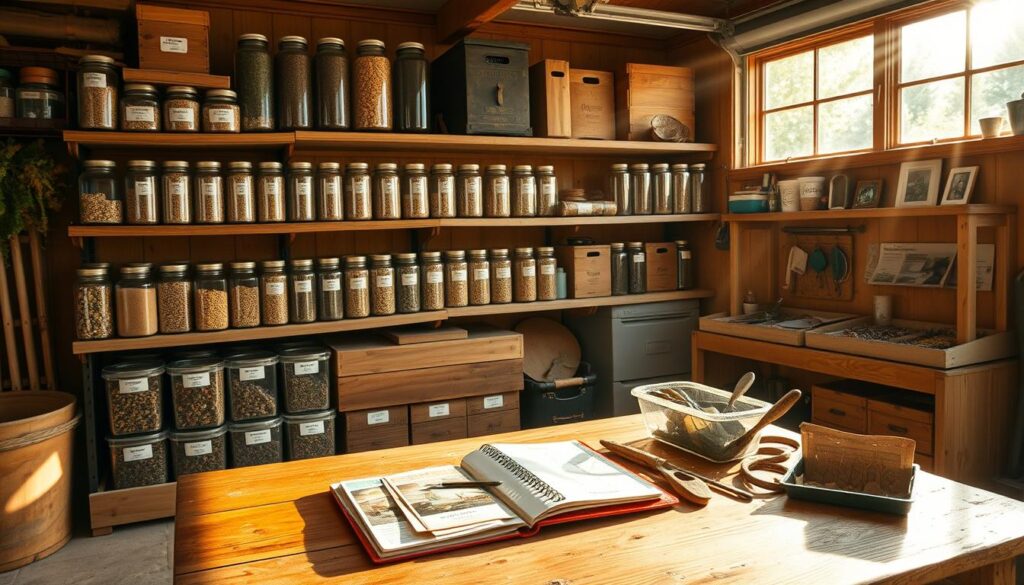
Seasonal Seed Rotation
Implementing a seasonal seed rotation can help ensure that you’re using your seeds before they go bad. Organize your seeds by the season they’re meant to be planted, and make sure to check on them regularly to remove any that are past their viability date.
Germination Testing Area
Having a dedicated germination testing area in your garage can help you determine the viability of your seeds. This can be as simple as a tray with a heating mat and a clear cover to create a mini-greenhouse effect. Regular testing can help you plan your gardening more effectively.
By implementing these smart solutions, you can significantly improve your gardening organization tips and make the most out of your garage gardening space.
DIY Projects to Enhance Your Garage Gardening Station
Elevate your gardening experience with simple DIY enhancements for your garage gardening station. By incorporating creative and functional projects, you can maximize your space and improve your gardening efficiency.
Building a Fold-Down Potting Bench
A fold-down potting bench is a great space-saving solution for your garage gardening station. It provides a dedicated area for potting and can be folded up when not in use, allowing for more space to work or store other gardening equipment. To build one, you’ll need a sturdy piece of wood, hinges, and some basic tools.
Creating Custom Soil Mixing Stations
A custom soil mixing station can streamline your gardening process. Consider building a station with separate compartments for different soil types and amendments. This will help keep your ingredients organized and within easy reach.
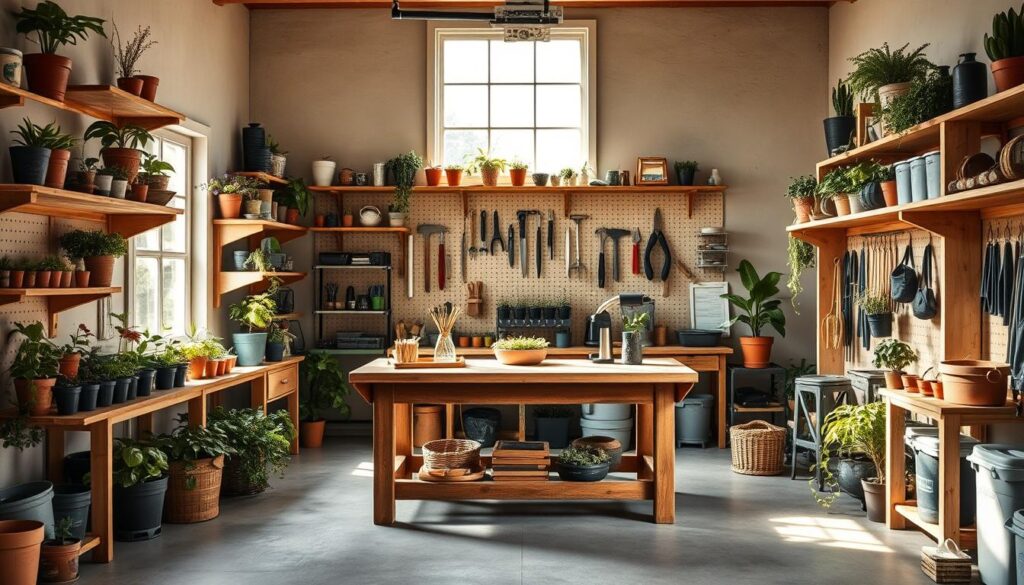
Upcycled Container Storage Solutions
Repurpose old containers to create unique storage solutions for your gardening supplies. For example, you can use plastic bins or wooden crates to store seeds, fertilizers, or gardening tools. Label each container to ensure easy identification.
Pest-Proof Storage Containers
To protect your gardening supplies from pests, consider using pest-proof storage containers. You can achieve this by adding weatherstripping to container lids or using rodent-proof materials for storage bins.
By implementing these DIY projects, you can create a more efficient, organized, and enjoyable garage gardening station. Whether you’re a seasoned gardener or just starting out, these enhancements will help you make the most of your gardening space.
Conclusion: Maintaining Your Organized Gardening Oasis
Creating an efficient garage gardening setup is just the first step; maintaining it is crucial for long-term success. By following the steps outlined in this guide on how to organize a gardening station in your garage, you’ve taken the first step towards a more enjoyable gardening experience.
To keep your gardening station organized, establish a routine of cleaning and tidying up after each use. Regularly inspect your tools and supplies, and make adjustments as needed. This will help prevent clutter from building up and ensure that your garage gardening setup remains efficient.
By maintaining your organized gardening oasis, you’ll be able to enjoy the benefits of gardening year-round, without the hassle of a cluttered workspace. So, take pride in your newly organized garage gardening space and enjoy the fruits of your labor.



